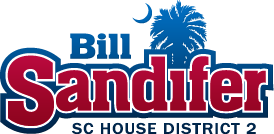Daily Journal: Sandifer reflects upon the 2001-2002 legislative session
William E. “Bill” Sandifer, III, District No. 2 – Oconee County, member of the South Carolina House of Representatives sees the recently completed 2001-2002 legislative session as one of the most intense, issue-filled two-year cycles in recent history.
While some bills he considered important passed the House but not the Senate, Sandifer said progress was made in several areas. “When the 2002 Session of the General Assembly initially convened in January, the projected budget shortfall was high on our priority list for discussion, he stated, “Once again, the Legislature was faced with resolving a budget shortfall without negatively affecting education or service delivery from primary agencies”.
In the last two years there were thousands of legislative initiatives offered by the 170 members of the House and Senate. Many measures simply ran out of time and were not passed. Some bills, because of their content, should have never been considered, and some bills were good ideas and will probably be reintroduced next year, Sandifer stated.
He stated four very important bills passed the House, but did not pass the Senate; these were truth-in-sentencing campaign finance reform, election law reform, and shortening the legislative session.
The House member provided this summary of some of the more comprehensive legislation passed during the 2002 legislative session. The budget – because of the national recession, South Carolina experienced a dramatic shortfall in tax revenues, forcing two mid-year budget cuts, and serious cut-backs in funds available for state agencies as well as local government funding. This situation was experienced by most of neighboring states as well. After rejecting any form of general tax increase, the Legislature opted instead to use selective cuts to agencies and programs to offset the $400 million shortfall, protecting only K-12 public education and Medicaid from cuts.
Public Education – The No. 1 priority was education and the 2002-2003 budget allocated some $61 million in new funding for public education. Each of the Education Accountability Act initiatives recommended by the State Board of Education were fully funded, as was continuing full funding for extra pay to those teachers achieving National Certification.
In addition, through the Lottery Spending Act, funding or annual replacement of the aging school bus fleet was provided, as were moneys to support new initiatives in reading, math, science, and social studies for K-5 pubic education.
Higher education – Through the Lottery Spending Act, the major portion of lottery profits were allocated for student scholarships, increased Tuition Grants, higher education technology, and the establishment of “endowed chairs” on a matching basis with gifts to three research institutions, including Clemson.
